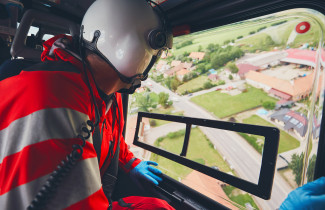The doctoral dissertation in the field of Medicine will be examined at the Faculty of Health Sciences at the Kuopio campus. The public examination will be streamed online.
What is the topic of your doctoral research? Why is it important to study the topic?
The topic of my doctoral research is data management of Emergency Medical Services (EMS) in Finland. EMS are a vital part of acute healthcare services. The Emergency Response Centre dispatches about 800 000 EMS missions per year, and therefore, EMS are comprehensive and significant for society. For historical reasons, the data management of EMS have focused on dispatch and transportation. Yet, we do not have national and systematic EMS patient data and data of the benefits of EMS to these patients.
What are the key findings or observations of your doctoral research?
The following future implications can be drawn from this study. The first two of them relate to the development of national data and the latter two to the better utilisation of existing data. Firstly, the main focus of EMS data must be shifted from dispatch and transport to patient data. Only in this way, the prehospital care can be assessed and developed systematically. Therefore, the new national electronic patient care record should be implemented in EMS for national use as soon as possible. Secondly, the strengths of the EMS databases in Denmark and the US should be utilised in the construction process of the Finnish EMS database. The Danish database includes patient data covering the entire pathway from dispatch to the end-point data. The NEMSIS database of the US produces openly published national process data of EMS. These inspiring examples could support the development of EMS, e.g. for the reform of health and social care in Finland. Thirdly, the target response times of the highest priority EMS missions in the urban areas should be set at a national, not regional level. A three-tiered EMS dispatch priority model distinguishing life-threatening, acute and non-acute emergencies should be developed, comparable to the other Nordic countries. Fourthly, since part of the National Institute of Health and Welfare’s (THL) morbidity indexes correlate with the number of EMS missions, the appropriate indexes could be taken into account in the financing criteria of EMS, in addition to the usual population-based calculation models.
How can the results of your doctoral research be utilised in practice?
Prompt implementation of the new national electronic patient care record would enable to obtain EMS patient data in a uniform and nationally comprehensive model. The THL’s national EMS database could enable to evaluate the entire chain of EMS patients from dispatch to outcome data, and to compare EMS data nationally between welfare areas, and internationally. These development steps are a path to better prehospital care.
What are the key research methods and materials used in your doctoral research?
My doctoral thesis is a monograph that describes both the development and future prospects of EMS data management. In addition, I have studied national EMS data of the years 2018-2020 and compared to the corresponding data of other Nordic countries.
The doctoral dissertation of Lasse Ilkka, Licentiate of Medicine, entitled Emergency Medical Services (EMS) in Finland - National data management as a path to better prehospital care will be examined at the Faculty of Health Sciences. The Opponent in the public examination will be Docent, Professor h.c. Reijo Haapiainen of the University of Helsinki, and the Custos will be Professor Jouni Kurola of the University of Eastern Finland. The public examination will be held in Finnish.
Doctoral defence online (In Finnish)
Photo available for download
For further information, please contact:
Lasse Ilkka, Lic Med, lassei (a) student.uef.fi, 0505702113



